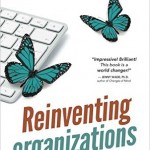Reinventing Organizations – Soulful workplaces

Have you ever read a book you want to either recommend or offer to everyone you know? One of those books you just immersed yourself in and left totally inspired by ?
Well, this is what happened to me a few weeks ago when I bought « Reinventing organizations » by Frederic Laloux.
Frederic Laloux researched 12 organizations who use fundamentally new ways to manage work and their employees. These so called evolutionary-teal organizations are self-managing, agile and adaptive, and they deliver extraordinary results. And all found the recipe to build soulful workplaces.
Here is the corporate picture Frederic Laloux paints in the early chapters of his book :
We are increasingly disillusioned by organizational life. For people who toil away at the bottom of the pyramids, surveys consistently report that work is more often than not dread and drudgery, not passion or purpose. <…> . And it’s not only at the bottom of the pyramid. There is a dirty secret I have discovered in the fifteen years I have spent consulting and coaching organizational leaders: life at the top of the pyramids isn’t much more fulfilling. Behind the façade and the bravado, the lives of powerful corporate leaders are ones of quiet suffering too. Their frantic activity is often a poor cover up for a deep inner sense of emptiness. The power games, the politics, and the infighting end up taking their toll on everybody. At both the top and bottom, organizations are more often than not playfields for unfulfilling pursuits of our egos, inhospitable to the deeper yearnings of our souls
An increasing number of us yearn to create soulful organizations, if only we knew how. Many of us don’t need convincing that new types of companies, schools, and hospitals are called for. What we need is faith that it can be done and answers to some very concrete questions. The hierarchical pyramid feels outdated, but what other structure could replace it? How about decision-making? Everybody should make meaningful decisions, not just a few higher-ups, but isn’t that just a recipe for chaos? How about promotions and salary increases? Can we find ways to handle such matters without bringing politics to the table? How can we have meetings that are productive and uplifting, where we speak from our hearts and not from our egos? How can we make purpose central to everything we do, and avoid the cynicism that lofty-sounding mission statements often inspire? What we need is not merely some grand vision of a new type of organization. We need concrete answers to dozens of practical questions like these
Can we create organizations free of the pathologies that show up all too often in the workplace? Free of politics, bureaucracy, and infighting; free of stress and burnout; free of resignation, resentment, and apathy; free of the posturing at the top and the drudgery at the bottom? Is it possible to reinvent organizations, to devise a new model that makes work productive, fulfilling, and meaningful? Can we create soulful workplaces—schools, hospitals, businesses, and nonprofits—where our talents can blossom and our callings can be honored?
At a very high level, and based on the researched companies, he described the so-called Teal Organizations as having achieved three important breakthroughs:
1. Self-management: Teal Organizations have found the key to operate effectively, even at a large scale, with a system based on peer relationships, without the need for either hierarchy or consensus.
2. Wholeness: Organizations have always been places that encourage people to show up with a narrow “professional” self and to check other parts of the self at the door. They often require us to show a masculine resolve, to display determination and strength, and to hide doubts and vulnerability. Rationality rules as king, while the emotional, intuitive, and spiritual parts of ourselves often feel unwelcome, out of place. Teal Organizations have developed a consistent set of practices that invite us to reclaim our inner wholeness and bring all of who we are to work.
3. Evolutionary purpose: Teal Organizations are seen as having a life and a sense of direction of their own. Instead of trying to predict and control the future, members of the organization are invited to listen in and understand what the organization wants to become, what purpose it wants to serve
To learn more, you can also have a look at this Q&A with the author.
I have written on this blog and in « Ecological Leadership » on several topics described in Frederic’s book. Engagement (one and two) , Giving and receiving feedback, Non Violent Communication, Purpose (one and two), Decision Making, Mindfulness, Coaching …
Although nothing will replace reading the entire book, I will further explore in a series of posts some aspects of the book I found particularly interesting . Well, the truth is that I was hooked from the first page until I finished the book 😃, but I will “double-click” more specifically on the following topics :
![]() Fear or Ego-based organizations and workplaces
Fear or Ego-based organizations and workplaces
![]() Feedback and Performance Management in Teal Organizations
Feedback and Performance Management in Teal Organizations
![]() Where to start in your own organization
Where to start in your own organization
Looking at why I consider the above so critical in today’s corporate world (mostly dominated by the “Amber Orange” view, as described in the book) and offering my humble perspective on each topic.
In the meantime, I would love to hear from you what you already do today to make your own workplace more soulful ? Thank you.

Leave a Reply